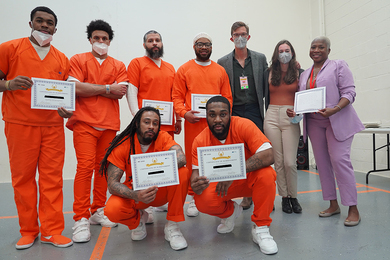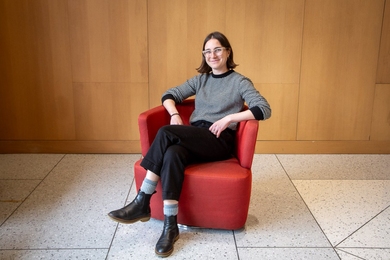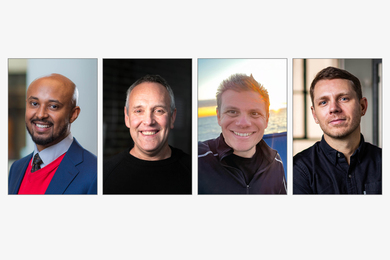A visiting German family was quite pleased with their child's experience at the Technology Children's Center--so pleased that they invited one of its teachers to come to Germany and give their local day--care center a few pointers.
In the fall of 1992, Dr. Christian Lischke of Hamburg came to MIT as a visiting scientist with the Laboratory for Manufacturing and Productivity. With him was his wife Martina Heuer and three-year-old daughter Jana Heuer, who went to TCC during her stay. When the family returned to Germany after three months here, Jana started going to the day-care program at Ms. Heuer's company. But after seeing TCC in action, her parents found their preschool wasn't as good as the one at MIT.
"They were very impressed with the way [our] school was run," said Lisa Happel, lead teacher of TCC's day care program. "Dr. Lischke really felt there were a lot of challenging activities." In contrast, the German facility Jana attended "wasn't really theme-based," she said. Whereas TCC organizes different activities to reflect topical ideas such as springtime or Halloween and alters its play space to reflect these themes, its German counterpart mostly stuck with a standard roster of games and activities "and didn't really make the effort to do the little extras." For example, Ms. Happel said, one of TCC's teachers recently drove to Ipswich to get fertilized eggs so the children could watch baby chicks hatch. "We really prepare the area and choose things to talk about. There's always something new happening in the classroom."
Dr. Lischke made several more business trips to the United States, when he would take the opportunity to talk with Ms. Happel to learn more about how TCC operated and get suggestions to pass on to the German day care teachers. However, this wasn't enough, he felt, so he offered to pay Ms. Happel's way to Germany and host her for a week so she could observe his daughter's day care center and make recommendations directly. She made the one-week trip in January.
One reason Ms. Happel was selected to make the trip was because she is involved in a two-year pilot program sponsored by the Child Care Careers Institute (a collaboration on day-care centers, the United Way and other organizations) called the Early Childhood Mentor Teacher Project. The program helps teachers learn how to be mentors to colleagues and others who work with young children.
"It was so wonderful to be able to use those skills" with the German teachers she was helping, she said. "It was a really professionally enhancing experience for me."
Something Ms. Happel noticed immediately was the German facility's pleasant buildings compared to the modern utilitarian structures found here. "Aesthetically the school was very beautiful," with old-fashioned architectural features including French windows and a patio, Ms. Happel noted.
There was one potential stumbling block: she didn't speak any German. But another German family with a child at TCC, the VanOpdorps, suggested she attend the German Saturday School of Boston, where German children in this area can go once a week to speak their native language. She practiced speaking and worked with teacher Angelika Evans, "and that gave me enough German to be able to play a little bit with the children" in Hamburg, she said.
Fortunately, the two teachers in Germany with whom Ms. Happel worked were both fluent in English. Her visit "was well received," she said, "but I think they felt underpaid. It needs a dedicated person to put in all that extra effort when your paycheck stays the same." For her, doing something like changing around the play area from a make-believe pet shop one week to a garden the next "is worth it. The children get much more excited about coming because they know something new will always be here."
The TCC children benefited from the trip as well--Ms. Happel brought back items for them to play with, including a game with pictures of Germany and some traditional wooden puppets.
Ms. Happel also hopes to bring the Germans themselves to America; TCC has extended an open invitation for them to visit. "We really want to keep the relationship going," she said. "It's our hope that we can keep conversing back and forth and that they will come here next."
A version of this article appeared in the April 13, 1994 issue of MIT Tech Talk (Volume 38, Number 29).





